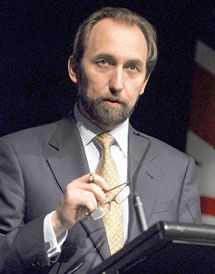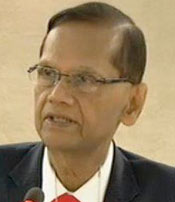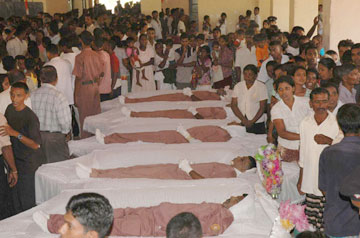|
Opinion:
Navi Pillay has last dig at Sri Lanka
by K.M.H.C.B. Kulatunga
There is a Sinhala saying that the devil who leaves would break even
the pot when he leaves (Yana yaka korahath bindagena yanawa). This is
exactly what the outgoing United Nations Human Rights Chief Navi Pillai
seems to be doing before she retires.
|

Prince Zeid Ra’ad Zeid al-Hussein will take over as United
Nations Human Rights Chief on September 1 |
It was an open secret how Pillay acted in a highly controversial
manner during Sri Lanka's relentless battle against terrorism.
Thereafter, she was instrumental in using the UN Human Rights Council to
level baseless war crimes allegations against Sri Lanka's valiant
Security Forces.
Pillay was fast asleep when the LTTE terrorists were playing hell,
inflicting untold misery on 21 million people in Sri Lanka subjecting
them to large-scale bomb explosions.
Thousands of people, including women and children fell unfortunate
victims to the massive bomb blasts. The Tigers held people in the North
and the East as a human shield against the advancing Security Forces
during the battle against terror. Neither Pillay or any of the
‘godfathers’ of human rights ever uttered a word of comfort on behalf
those hapless civilians.
Statements
Pillay's conduct during and after the humanitarian operation was
highly questionable. Her ethnic connection to Tamils is known world over
and she used her high office to pamper the LTTE terrorists by taking Sri
Lanka and its Security Forces to task. She issued a plethora of
statements against Sri Lanka and its Security Forces during the
humanitarian battle.
Now that Pillay is packing her baggage to retire from Geneva-based
UNHRC, she would have thought that she should have her last dig at Sri
Lanka. It is crystal clear that Pillay is using all her might to project
a gloomy picture of Sri Lanka to her successor and the international
community before she retires.
Sri Lanka has exposed the biased nature adopted by the outgoing UN
High Commissioner for Human Rights, for her last ditch efforts to
influence OHCHR investigation process against Sri Lanka.
In an e-mail interview to the Thomson Reuters Foundation, Pillay has
said, “The United Nations can conduct an effective investigation into
reports of war crimes in Sri Lanka without visiting the country.”
Exposed
|

External Affairs Minister G. L. Peiris |
Ministry of External Affairs officials has slammed High Commissioner
Pillay for making such a high-handed statement relating to the
investigation on Sri Lanka that has been undertaken by the UN Office of
the High Commissioner for Human Rights (OHCHR) following the adoption by
a vote of Resolution 25/1 in March 2014. It is a clear interference by
Pillay to the panel during the final few weeks in her position.
The External Affairs Ministry, in a statement, has further exposed
the High Commissioner who is due to leave office at the end of this
month making public pronouncements to the media on an investigation
which has commenced only recently is a clear indication of personal
bias.
It is evidence of an attempt to influence the investigation process
and make it follow a preconceived trajectory. She refers in her
statement to a ‘wealth of information outside Sri Lanka’.
The prejudice and lack of objectivity on issues pertaining to Sri
Lanka displayed by Pillay in the past are unfortunate.
This is the same wealth of information that she has tended to refer
to in the past, justifying it to be from credible sources, although
their origins continue to remain undisclosed, and verification has not
been facilitated.
Terror
It is deplorable to note that Pillay has desisted from acknowledging
verifiable statistics of UN sources. Instead, she has sought to endorse
exaggerated claims of former UN sources of spurious credentials by
including such uncorroborated statistics in UN documentation. An
utterance of this nature from an officer who is expected to maintain the
highest standards of objectivity is disappointing.
The prejudice and lack of objectivity on issues pertaining to Sri
Lanka displayed by UN High Commissioner for Human Rights in the past are
unfortunate. Just days after Sri Lanka's Security Forces successfully
accomplished the world's largest human rescue mission by liberating
nearly 300,000 Northern civilians from the clutches of the LTTE terror,
Pillay formally called for an international investigation into events in
Sri Lanka, adducing a basis and in total disregard of the basic
principle of international law, that national remedies must be exhausted
before resorting to international mechanisms.
|

Victims of LTTE terror in Kebbethigollewa. - File Photo
|
Her claim on May 26, 2009 was a clear indication of the resolute
determination with which the High Commissioner set out to pursue her
objective of internationalising issues pertaining to Sri Lanka,
discounting and disregarding all internal processes even before they
could be set in motion.
To advance this agenda, Pillay has repeatedly sought, through her
reports and oral presentations to the Council, to confer an official
status through the Council and credibility on the Advisory Report to the
UN Secretary General. The allegations against the Government in this
Report, in flagrant violation of natural justice, were drawn from
testimonies shrouded in secrecy in view of the twenty-year
confidentiality granted to those who had given testimony.
Credibility
In her statement to the UN Human Rights Council on April 26, 2011,
Pillay had referred to Sri Lanka having conducted the issue “under the
guise of fighting terrorism” when it has been widely acknowledged that
the battle was against a separatist terrorist group proscribed by
several countries. Such rhetoric by a senior UN official could place the
credibility of the UN system at stake.
Exceeding the provisions of the Programme Budget Implications arising
from Resolution 25/1 adopted by the Council, the Office of the High
Commissioner has chosen to unilaterally proceed to appoint three
“experts” instead of the prescribed two. Moreover, ignoring the
provisions of Resolution 25/1 which calls for the OHCHR to undertake a
comprehensive investigation “during the period covered by the Lessons
Learned and Reconciliation Commission”, i.e. 21st February 2002 to 19th
May 2009, the OHCHR has arbitrarily and unilaterally extended the period
of its investigation to cover the period up to November 15, 2011.
By comparing in her comments, the situation in Sri Lanka with those
elsewhere, that too situations of emergency, Pillay attempts to create a
distorted impression of the position in Sri Lanka. Ignoring completely,
the socio-economic and infrastructural developments that have taken
place since the end of terrorism, the UNHRC chief continues to invite
the attention of the international community to Sri Lanka where there is
no human rights or humanitarian emergency which merits such
consideration, intrusive action or relentless pursuit.
Stability
Sri Lanka has consistently engaged with the United Nations system
including the UN Human Rights Council, Treaty Bodies, Special Procedures
and the wider international community in a spirit of goodwill and
cooperation. The OHCHR should seek to work with Sri Lanka in a
cooperative, collaborative, constructive and transparent manner to
further strengthen the State’s capacity to promote and protect human
rights, in accordance with its mandate.
Instead, Pillay pays scant regard to the ongoing delicate process of
reconciliation in Sri Lanka. Ignoring the cultural sensitivities and
value systems of local populations, she advocates retributive justice
and coercive processes “as an avenue to achieve lasting peace and
reconciliation” which in fact would only serve to destabilise the
intricate balance of the process of national reconciliation and militate
against stability and peace in the country.
We strongly believe that Pillay's successor as the new UN High
Commissioner for Human Rights, Prince Zeid Ra’ad Zeid al-Hussein, would
be guided at all times by the principles of objectivity, impartiality,
non-selectivity and equal treatment while respecting the sovereignty,
territorial integrity and domestic jurisdiction of Statesin carrying out
his mandate and in guiding the work of the OHCHR. The Government of Sri
Lanka will continue to engage constructively with the OHCHR.
Pillay has often cared more for human rights of LTTE terrorists
killed in action than the civilians killed by the Tigers. Her team has
always shown an undue worry on human rights of LTTE cadres, clad in
civil attire.
Once such terrorist abandon his weapon during battle, Pillay's team
considered them as civilians killed or injured in action. Knowing
Pillay's theory well, most of the LTTE cadres had not been in their
uniform during strategic confrontations with the Security Forces.
Pressure
As External Affairs Minister Prof. G.L. Peiris had quite rightly
pointed out at the 21st ASEAN Foreign Ministers Regional Forum in Nai
Pyi Taw, Myanmar recently, fighting terrorism, in all its forms and
manifestations, Sri Lanka has always believed in the need for its
elimination in its entirety, given that it has fundamentally impeded
progress in large swathes of the globe.
It is ironic, however, that Sri Lanka, having eliminated terrorism
for the benefit not only of the people of our country but a
significantly wider region, is today having to contend with immense
pressure exerted primarily through the use of human rights as a
political tool.
There are several priority areas - counter terrorism, maritime
security, support for disaster relief as well as non-proliferation and
disarmament.
Nations need to rally in solidarity with those directly affected by
the scourge of terrorism and extend their fullest co-operation for its
eradication, and ensure equal treatment of all countries in the
international arena.
Any form of selectivity will lead to cynicism. Countries and their
people's possess a tapestry of history, culture, traditions and values
which date back many centuries. Sri Lanka, having nurtured
representative democracy for a long period in Asia, attaches great
importance to reconciliation.
Having based our progress on this principle, we as a nation have
entered a new and dynamic era. Our consistent emphasis has been on the
value of a home grown solution that Sri Lanka has always advocated.
But the international community should allow Sri Lanka to make its
own advancement without any outside interference. |

